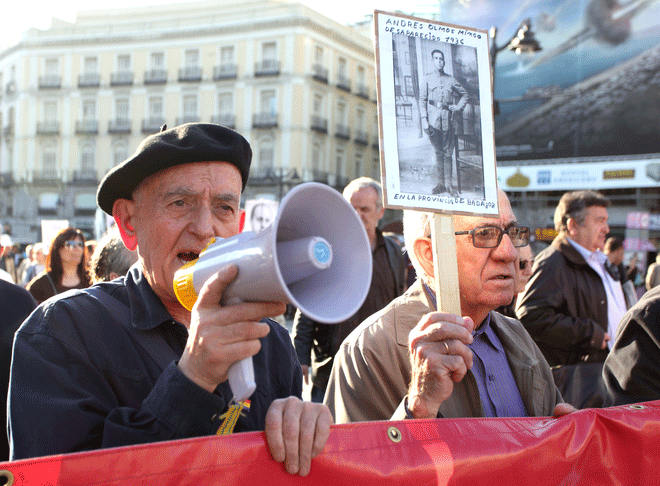The Spanish Supreme Court has jailed nine Catalan separatist leaders for their roles in the independence referendum in 2017, deemed illegal by the Spanish government. Oriol Junqueras, former vice president of Catalonia, was sentenced to 13 years, the highest sentence handed out. A new international arrest warrant for former Catalonia President Carles Puigdemont, who fled to Belgium, has been issued. As protesters clash with police on the streets of Barcelona over the sentencing, Index looks back on the struggle for freedom of expression in Spain and particularly Catalonia, from the last years of General Francisco Franco’s regime, to the present.
Poems from Catalonia vol 1, 2 1972
https://journals.sagepub.com/doi/pdf/10.1080/03064227208532183
Joan Brossa, born in 1919, wrote poetry about Franco’s invasion and destruction of independent Catalonia during the Spanish Civil War (1936-1939). His works are allegories about the bitterness over the cultural repression in Catalonia under Franco. However, the allegories were too transparent to avoid censorship by the Spanish authorities. Index acquired copies of some of the censored poems.

Weekly meeting to remember Franco’s victims in the Puerta del Sol, Madrid [Image credit: NathaliePaco – Demotix]
https://journals.sagepub.com/doi/pdf/10.1080/03064227408532323
The final years of Franco’s regime saw a confused attitude towards censorship. Franco wanted to outwardly present a degree of liberalism to the international political community, while still enforcing censorship inwardly. John Butt argued that this may be why right-wing extremists suppressed artists and thinkers and got away with it; the government allowed these groups to do their dirty work. Vigilantes poured acid over some of Picasso’s works and threw bricks through bookshop windows. The police did not charge them. It was a period of haphazardly applied censorship, creating an atmosphere of insecurity for Spanish writers.
Spanish journalists in jeopardy vol 9,6 1980
https://journals.sagepub.com/doi/pdf/10.1080/03064228008533131
Even in post-Franco Spain, there were significant threats to freedom of expression for journalists. The 1978 constitutional guarantee of press freedom proved to be a formality, not upheld in practice. In May 1980, 60 journalists, writers and artists faced court action, with offenses including “outrage to public morals”. Juan Luis Cebrian, the author of this article, was the editor of the Madrid daily newspaper El Pais. He was sentenced to three months in prison for an editorial, published two years prior in 1978, in which he defended freedom of expression. Read about his experiences here.
Shifting an elephant – freedom of expression in spain today vol 11, 3 1982
https://journals.sagepub.com/doi/pdf/10.1080/03064228208533377
In the first two years after Franco’s death there was excitement about the new democracy, as many newspapers and magazines were set up. But in a bid to pacify Francoists, laws remained in place that allowed journalists to be targeted. Offenses included insult or disrespect to the army and the royal family. In 1977 anti-terrorist legislation was brought in, which failed to define “apology” for terrorism. This left it open to abuse by those wishing to penalise journalists. Read Malcolm Coad’s article from this pivotal point in Spanish history here.
Puppet state vol 46,1 2017
https://journals.sagepub.com/doi/full/10.1177/0306422017703623
Spanish puppeteers Raúl García Pérez and Alfonso Lázaro de la Fuente were arrested in 2016 for glorifying terrorism. The evidence against them was the content of puppet show Pérez and Lázaro de la Fuente were performing as part of carnival festivities in Madrid. The show had included a character holding a banner displaying the name of a fictional terrorist organisation. Lázaro de la Fuente told Index about his experiences following his arrest, and discussed the consequences of performers being persecuted for their art in modern Spain.
No laughing matter vol 46, 2 2017
https://journals.sagepub.com/doi/full/10.1177/0306422017716058
Silvia Nortes explored the reforms the Spanish political party, the Partido Popular, pushed through which allowed the prosecution of comedians, journalists and social media users, quashing their right to freedom of expression. Nortes cites several examples of comedians who have been prosecuted and even jailed. Read their jokes here.
They can’t stop the music vol 46,4 2017
https://journals.sagepub.com/doi/full/10.1177/0306422017748822
Cesk Freixas, a musician and member of Popular Unity Candidacy, a pro-Catalonia independence party, has drawn the attention of the ruling Partido Popular. Unhappy with his strong pro-independence message, they attempted to have his shows cancelled.
Freixas, who performs in Catalan, told Index he has been accused, among other things of “boasting the Catalan language”. Singer-songwriter Albert Pla has also faced discrimination for championing independence for Catalans. Read more about censorship of the independence movement here.




